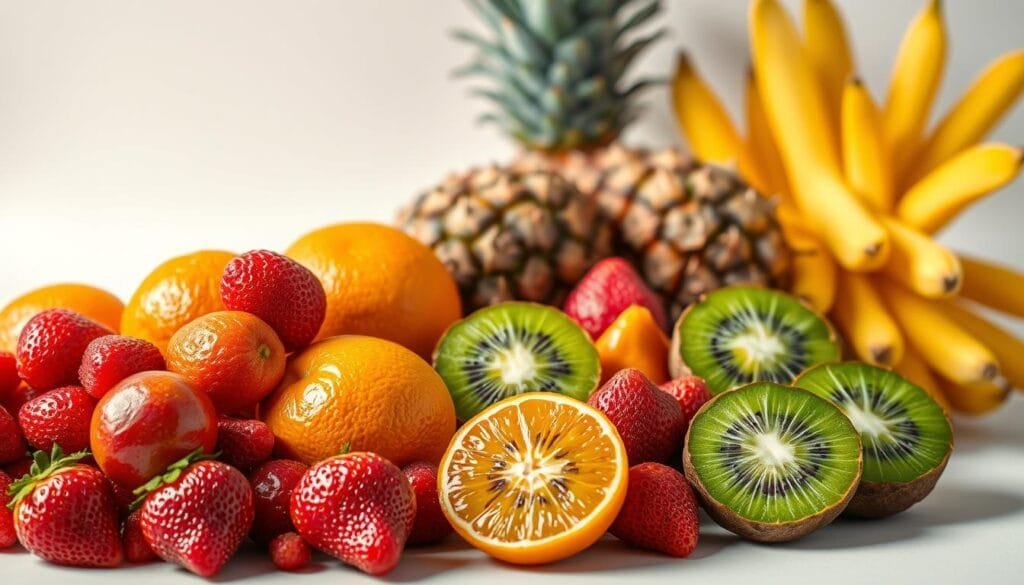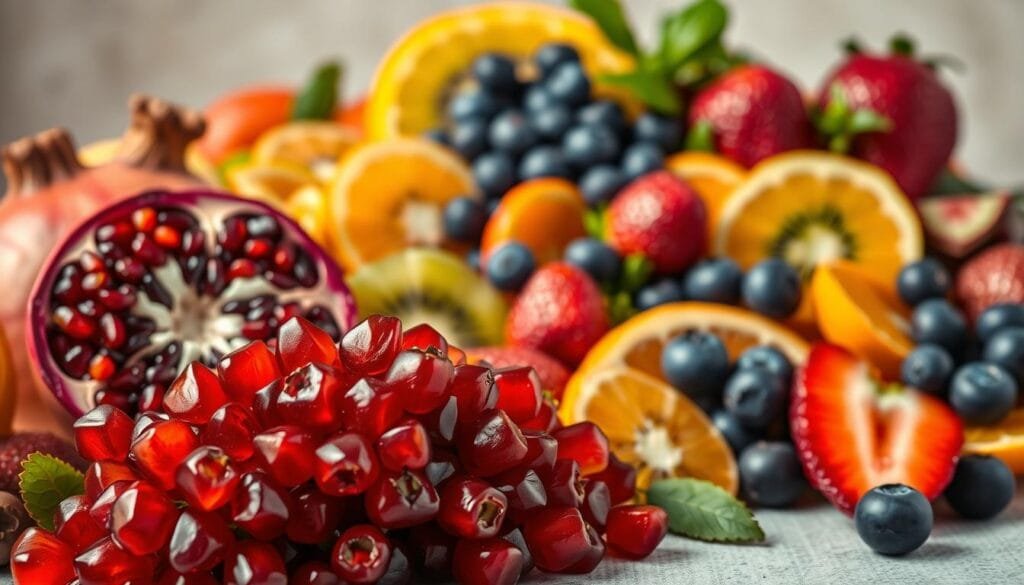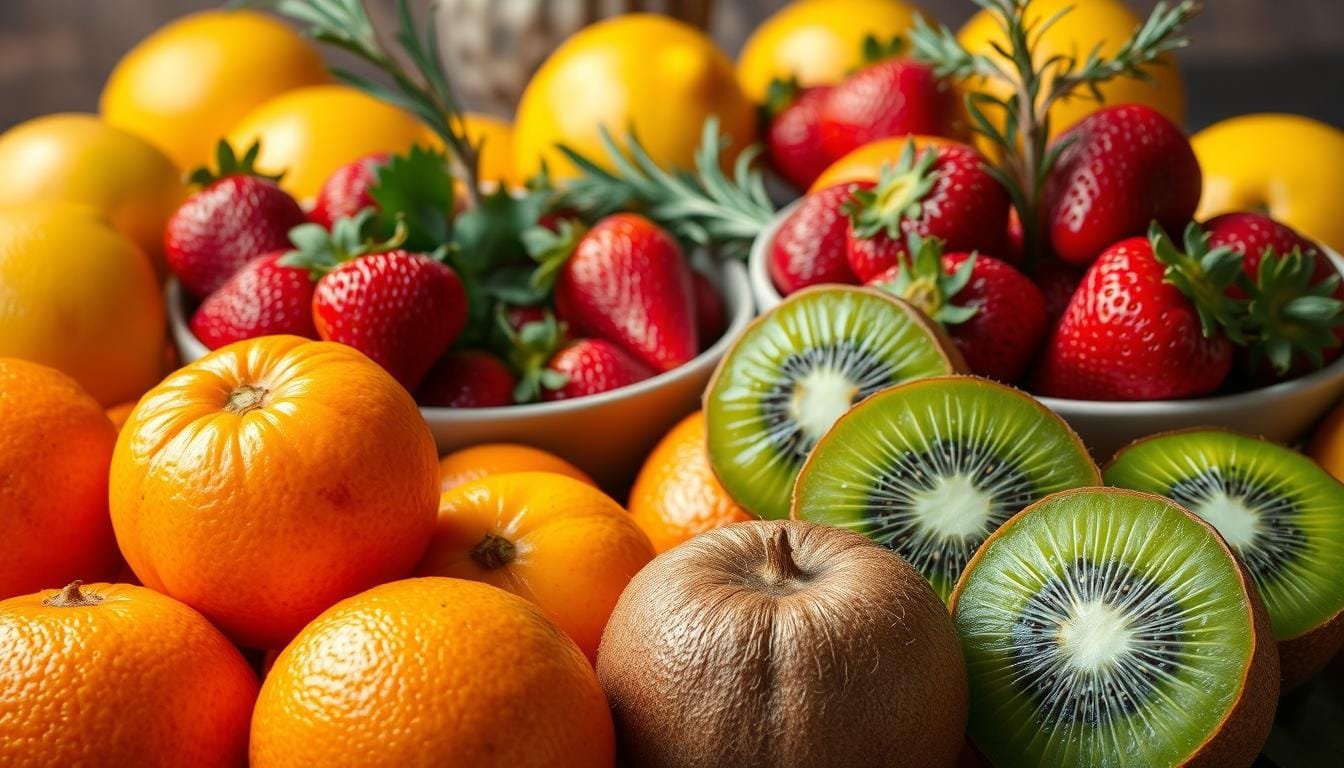Currently Empty: RM0.00
Did you know that just one kakadu plum contains 100 times more vitamin C than an orange? This surprising fact highlights how diverse nature’s nutrient sources can be. Maintaining strong immunity and glowing skin starts with getting enough of this essential nutrient daily.
Wellness Concept, a trusted health partner in Malaysia, recommends consuming 90mg (men) or 75mg (women) of vitamin C daily. It helps protect cells, heal wounds, and even prevents scurvy—a condition linked to deficiency. For personalized advice, reach out via WhatsApp at +60123822655 during business hours.
Beyond citrus, lesser-known options like acerola cherries and guava pack a powerful punch. Locally available fruits in Malaysia make it easy to meet daily needs while supporting overall wellness. Discover the top 20 choices that keep your immune system strong and skin radiant.
Key Takeaways
- Kakadu plums offer 100x more vitamin C than oranges.
- Daily needs: 90mg (men) / 75mg (women) for optimal health.
- Vitamin C boosts immunity, skin health, and wound healing.
- Malaysia has local superfoods like guava and acerola cherries.
- Wellness Concept provides expert guidance via WhatsApp.
Introduction to Vitamin C and Its Importance
The human body cannot store this essential antioxidant, making daily intake crucial. Unlike fat-soluble compounds, it dissolves in water and exits the body quickly. This means consistent replenishment through dietary sources is key for optimal health.
- Collagen production: Keeps skin, tendons, and blood vessels resilient.
- Immune support: Enhances white blood cell function to fight infections.
- Antioxidant protection: Neutralizes free radicals linked to chronic diseases.
- Iron absorption: Helps convert plant-based iron into a usable form, preventing anemia.
- Neurotransmitter synthesis: Aids in producing mood-regulating chemicals like serotonin.
Without enough, the body struggles. Scurvy—a condition marked by bleeding gums and fatigue—was historically common among sailors lacking fresh produce. Even mild deficiency slows wound healing and weakens the immune system.
In Malaysia, tropical fruits like guava and papaya help meet needs, though urban diets often rely on processed foods. Globally, adults need 75–90mg daily, but stress or illness increases requirements.
Pairing it with iron-rich meals or vitamin E boosts effectiveness. Studies also suggest it may reduce severity of respiratory infections, including COVID-19, by supporting immune responses.
What is Vitamin C Rich Fruits?
Tropical climates like Malaysia’s offer unique advantages for accessing potent dietary sources. These are classified as containing ≥12% Daily Value (DV) per serving—whether exotic kakadu plums or everyday bell peppers.

Raw options often far surpass cooked ones in bioavailability. For example, fresh guava retains 228mg per cup, while boiled mustard spinach loses 30% of its content. Heat-sensitive nutrients degrade easily.
Locally available picks like papaya and starfruit thrive in Malaysia’s humidity. A single guava delivers 140% DV, outperforming oranges. Such tropical fruits make daily intake effortless.
Leafy vegetables like parsley pack 133mg per cup—rivaling citrus. However, fruits generally have higher ORAC (Oxygen Radical Absorbance Capacity) scores, measuring antioxidant impact. Black currants score 7,950; lemons just 1,300.
USDA methods ensure accurate comparisons. Misconceptions about citrus dominance fade when data shows chili peppers (242mg/100g) beat navel oranges (59mg/100g). Diversity matters for optimal health.
Top 20 Vitamin C Rich Fruits for a Healthier You
Not all fruits are created equal—some deliver astonishingly high antioxidant levels. This curated list combines exotic superfoods and everyday staples to help you meet daily needs effortlessly.
1. Kakadu Plums: The Ultimate Powerhouse
With 2,907mg per 100g (5,000% DV), this Australian native tops the chart. One plum equals five oranges. Its tart flavor works well in jams or sauces.
2. Acerola Cherries: Tangy Immunity Boost
Packed with 825mg per ½ cup, these cherries reduce inflammation. Enjoy them fresh or blended into smoothies for a tropical twist.
| Fruit | Vitamin C per 100g | % Daily Value |
|---|---|---|
| Kakadu Plum | 2,907mg | 4,845% |
| Acerola Cherry | 1,650mg | 2,750% |
| Guava | 228mg | 380% |
| Yellow Bell Pepper | 183mg | 305% |
3. Rose Hips: Small but Mighty
These floral berries offer 426mg per 100g. Brew them into tea for a warm, immune-boosting drink during Malaysia’s monsoon season.
4. Chili Peppers: Spice with Benefits
One green chili packs 242mg—33% more than oranges. Capsaicin enhances absorption, making it perfect for sambal or stir-fries.
5. Guavas: Malaysia’s Sweet Secret
Locally grown guavas provide 228mg per cup. Eat the skin for extra fiber. Pair with lime for a refreshing rojak salad.
Pro Tip: Raw consumption preserves nutrients. Heat-sensitive options like parsley lose 30% when cooked.
6. Sweet Yellow Peppers: Colorful Nutrition
One cup delivers 183mg. Their mild flavor suits salads or grilled dishes. Combine with olive oil to boost vitamin E synergy.
7. Black Currants: Dark Berry Brilliance
These contain 181mg per 100g. Their high ORAC score (7,950) fights oxidative stress. Find them frozen in Malaysian supermarkets.

8. Cantaloupe: Hydrating and Nutrient-Dense
A single wedge has 49mg. Its water content aids hydration—ideal for Malaysia’s heat. Pair with yogurt for a gut-friendly snack.
9. Parsley: Garnish with Punch
Often overlooked, parsley offers 133mg per cup. Blend into pesto or tabbouleh for a fresh, herby kick.
10. Mustard Spinach: Leafy Green Hero
This veggie packs 130mg per 100g. Quick-steaming retains 90% of its nutrients. Try it in ulam or soups.
Did You Know? Combining these with iron-rich foods (like spinach + lemon) enhances mineral absorption by 67%.
How to Incorporate Vitamin C Rich Fruits into Your Diet
Boosting your daily nutrient intake doesn’t have to be complicated—just delicious. Simple swaps and smart prep methods maximize benefits from foods high in antioxidants. Here’s how to make them a seamless part of meals.
Easy Meal Ideas
Breakfast: Blend kiwi and spinach into smoothies, or top yogurt with papaya cubes. For a savory twist, add bell peppers to omelets.
Malaysian Recipes: Try asam pedas with guava for tanginess or rojak sprinkled with rose hips. These dishes balance flavor and nutrition.
“Pairing citrus with iron-rich greens increases absorption by 67%—a game-changer for plant-based diets.”
Smart Prep & Preservation
- Freeze: Cube papaya or acerola cherries for smoothies.
- Pickle: Mustard spinach retains crunch in vinegar brines.
- Dehydrate: Kale chips with chili pepper dusting.
Avoid boiling—steaming preserves 90% of nutrients. Overcooking destroys heat-sensitive compounds.
| Meal | Vitamin C Boost | Tip |
|---|---|---|
| Lunch | Red pepper hummus | Pair with whole-grain pita |
| Snack | Frozen mango cubes | Dust with lime zest |
| Dinner | Stir-fried mustard greens | Quick-cook on high heat |
For more nutrient-packed recipes, explore Wellness Concept’s guide. Local markets like Pasar Seni offer fresh guava and starfruit—ideal for daily needs.
Pro Tip: Store cut fruits in airtight containers to slow oxidation. A weekly planner ensures consistent intake.
Wellness Concept: Your Partner in Health
Wellness Concept bridges the gap between nutrition and daily health goals. Their team offers tailored counseling to optimize your dietary habits, ensuring you meet nutrient needs effortlessly.
Services include personalized vitamins intake assessments, especially for boosting immune function. Clients like Aina, a Kuala Lumpur teacher, reversed frequent colds by following their plan. “Within weeks, my energy doubled,” she shares.
Weekend support makes care accessible:
| Day | Hours | Service |
|---|---|---|
| Mon–Fri | 9am–7pm | Full consultations |
| Sat–Sun | 10am–5pm | WhatsApp guidance |
Free consultations via +60123822655 simplify starting your journey. Corporate programs also help offices reduce sick days through immune-boosting workshops.
They collaborate with Malaysian farms for fresh sources like guava and papaya. Their dietitians adapt global research to local tastes—think nasi lemak with chili peppers for extra benefits.
“Preventing risks like scurvy starts with small, sustainable changes.”
Whether adjusting meals or planning grocery lists, their system fits seamlessly into busy lifestyles. Reach out today to prioritize your health.
Conclusion
Kakadu plums, acerola cherries, and guava stand out as unexpected yet powerful sources for boosting health. These fruits offer far more than citrus, supporting immune system strength and disease prevention.
In Malaysia, seasonal produce like starfruit and papaya makes daily intake simple. Pairing them with leafy vegetables enhances absorption. Avoid over-supplementation—nature’s foods high in nutrients work best.
For personalized advice, Wellness Concept provides expert guidance via WhatsApp at +60123822655. Small dietary tweaks today lead to lasting benefits for your body.
FAQ
Which fruit has the highest vitamin C content?
Kakadu plums top the list, offering nearly 100 times the daily value in just one serving. Acerola cherries and rose hips also rank high.
Can bell peppers provide more vitamin C than oranges?
Yes! One cup of chopped yellow bell peppers delivers over 300% of the daily value, while oranges provide about 130% per medium fruit.
How does vitamin C benefit the immune system?
This powerful antioxidant supports white blood cell function, enhances skin’s defense barrier, and helps fight infections.
Are there vegetables with high vitamin C levels?
Absolutely. Brussels sprouts, broccoli, kale, and mustard spinach all contain impressive amounts, making them great dietary sources.
What’s the easiest way to add more vitamin C to my diet?
Blend strawberries into smoothies, snack on kiwi or guava, add red peppers to salads, or squeeze fresh lemon over meals.
Does cooking affect vitamin C content in foods?
Heat can reduce levels. For maximum benefits, enjoy fruits and vegetables raw or lightly steamed whenever possible.
Can vitamin C help with heart health?
Research suggests it may lower blood pressure and reduce heart disease risk by improving blood vessel function.
Are citrus fruits the best source of vitamin C?
While oranges and grapefruit are excellent, many other foods like papaya, lychee, and black currants actually contain higher concentrations.



